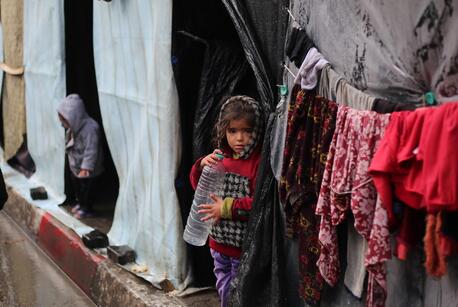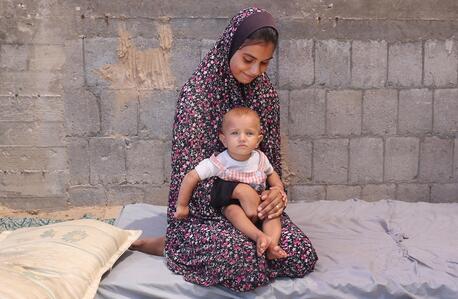
Nowhere in Gaza Is Safe for Children
As the assault on Rafah intensifies, 600,000 children remain caught in the crosshairs. UNICEF continues to call for an immediate, sustained ceasefire, the release of all hostages and an end to grave violations against children. UNICEF humanitarian assistance is making a difference for children in Gaza, but much more help is urgently needed.
Children don't start wars but they pay the highest price
More than 200 days of war have taken an unimaginable toll on children in the Gaza Strip: over 14,000 have been killed and 12,000 wounded; thousands more are missing. In October, families were ordered to evacuate and take shelter in Rafah in southern Gaza, swelling the city's population from 250,000 to 1.2 million. Now Rafah itself is under attack, placing the lives of 600,000 children at risk. On May 7, Israeli forces seized control of Rafah's vital border crossing, jeopardizing humanitarian aid deliveries that children rely on for survival.
“Rafah is a city of children," UNICEF spokesperson James Elder said in a Palais des Nations briefing in Geneva on May 7. “If we define safety – as international humanitarian law says we must – as freedom from bombardment, as well as access to safe water, sufficient food, shelter and medicine – then there is nowhere safe on the Gaza Strip to go to."

UNICEF is fighting malnutrition, shoring up health services, delivering vaccines, improving sanitation and more
UNICEF is on the ground in Gaza, striving to meet the urgent needs of Palestinian children and their families, many of whom have been forced out of their homes multiple times in the seven months since the start of the current conflict. Despite the huge difficulties of delivering supplies and services — including continued air strikes, fuel shortages, communications blocks and attacks on medical and humanitarian personnel and facilities — UNICEF continues to make an impact on the lives of children living through a terrible conflict.
Nutrition: UNICEF has established more than 80 outpatient treatment centers in Gaza, where children are screened for malnutrition. The acutely malnourished are treated with therapeutic feeding, while those at risk are provided with supplies to prevent acute malnutrition. UNICEF is the sole provider of supplies for treating acute malnutrition in Gaza, procuring and distributing these supplies to partners.
Health care: Malnourished children are more vulnerable to disease; 9 out of 10 children under 5 in Gaza are suffering from one or more infectious diseases. Levels of acute watery diarrhea are 20 times higher than typical. Twenty-five of Rafah's 36 hospitals have been destroyed; the remaining are damaged. UNICEF is working with partners to shore up health services including immunization to prevent the spread of disease.
Water: UNICEF is repairing damaged waterworks, including desalination plants and water wells, and pressing for the delivery of fuel necessary to operate the generators that power water systems and the trucks that deliver safe water. According to the latest situation report, in the last two weeks of April UNICEF provided 183,000 liters of fuel, which allowed the production of lifesaving water for over 1.6 million people, including over 800,000 children.
Sanitation: The massive displacement of people and vast numbers crowded into southern Gaza have created a waste management crisis. In Rafah, there is approximately one toilet for every 850 people. Despite lack of space and very limited building materials, UNICEF is providing sanitation facilities: 95 percent of all toilets built in southern Gaza since October 2023 were built by UNICEF.

Cash transfers give families purchase power to meet urgent needs; mental heath programs help children recover from trauma
Humanitarian cash transfers: Cash payments help sustain families' resilience. UNICEF has reached 85,000 vulnerable families in Gaza, including 25,000 people suffering from disabilities, with flexible funds they can use to meet their immediate needs. UNICEF has also delivered cash assistance to 35,000 pregnant and lactating women to help them afford nutritious food so they can have healthy babies, and provided assistance to 700 sanitation workers to clean up solid waste.
Mental health: Every child in Gaza needs mental health support to address the potential longterm effects of cumulative exposure to violence, the deaths of family members and friends, and injuries. UNICEF is working with partners to provide mental health and psychosocial support for kids, including hospitalized children recovering from their injuries. Giving children the opportunity to just be children for a while, through programs that center on drawing, games and interactive storytelling, helps them recover from the trauma they have experienced. By mid-April, UNICEF had provided psychosocial support services to more than 151,000 children and their caregivers.
A devastating humanitarian crisis gets worse
Now, exhausted and terrified families, already displaced multiple times, are being told they must move once again to places without access to the basic infrastructure they need to survive: safe water, proper sanitation, adequate shelter.
"Families' coping capacity has been smashed. They are hanging on — physically and psychologically — by a thread," said Elder. "Aid must flow. Hostages must be freed. Rafah must not be invaded. And children must no longer be killed. We have pleaded and implored countless times; we do so once more. For the children of Rafah. We need a ceasefire, now.”
Your contribution will help UNICEF reach children in need. Please donate today.
HOW TO HELP
There are many ways to make a difference
War, famine, poverty, natural disasters — threats to the world's children keep coming. But UNICEF won't stop working to keep children healthy and safe.
UNICEF works in over 190 countries and territories — more places than any other children's organization. UNICEF has the world's largest humanitarian warehouse and, when disaster strikes, can get supplies almost anywhere within 72 hours. Constantly innovating, always advocating for a better world for children, UNICEF works to ensure that every child can grow up healthy, educated, protected and respected.
Would you like to help give all children the opportunity to reach their full potential? There are many ways to get involved.





